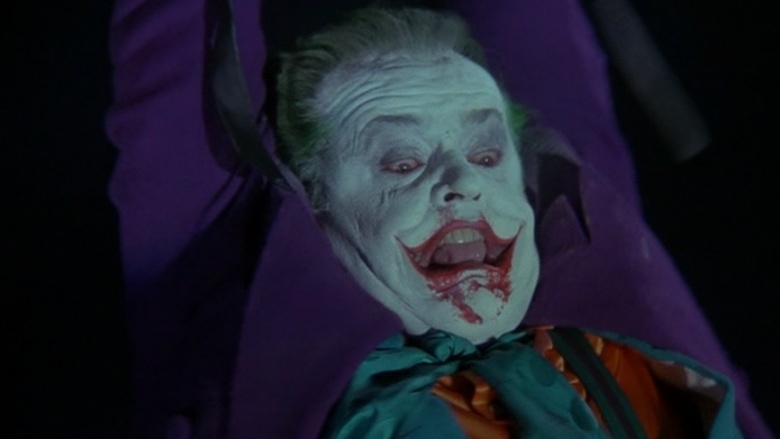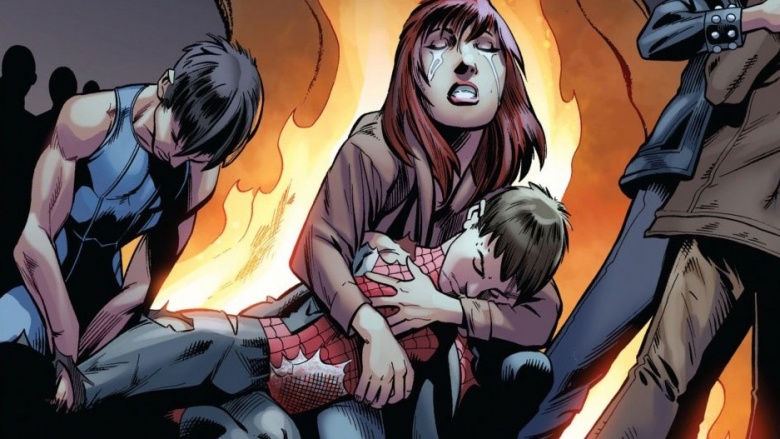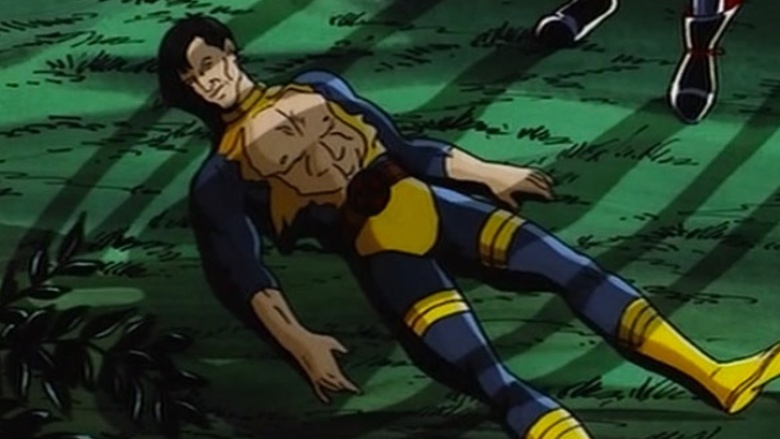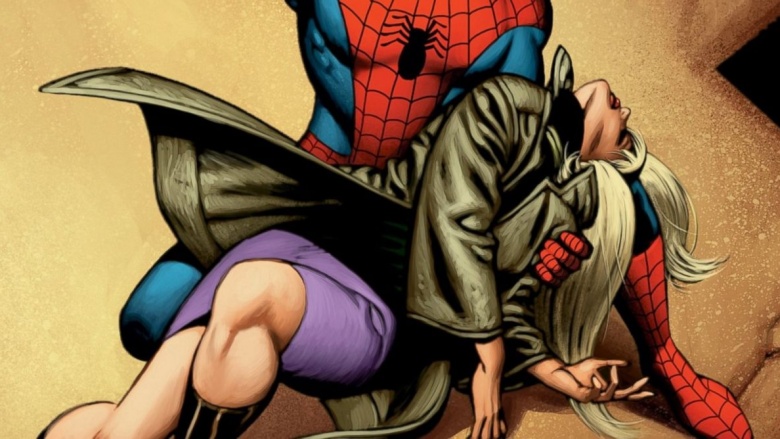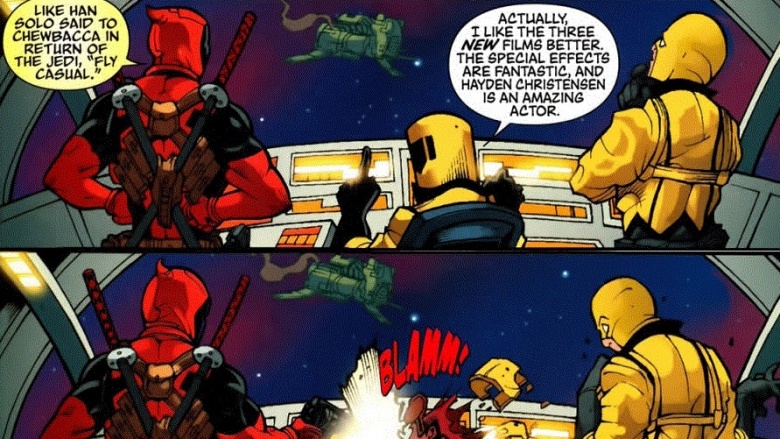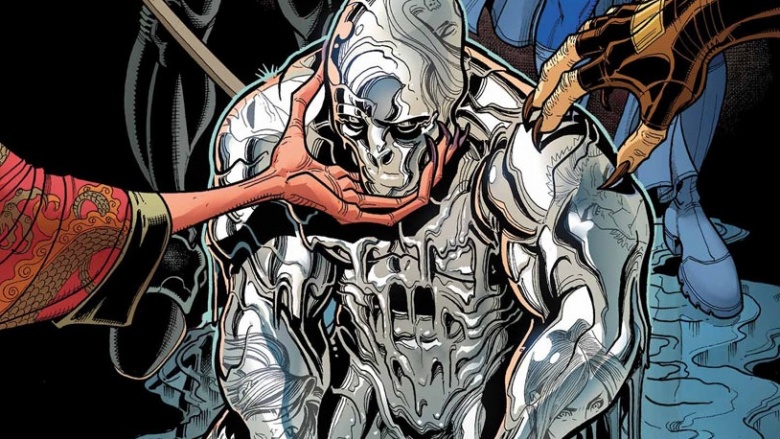Times We Were Happy To See A Marvel Or DC Character Die
If 100 comic characters die, 99 of those deaths quickly prove totally meaningless. Either they're magically resurrected somehow, where they miraculously survived the city-wide nuclear explosion, or SURPRISE! It was just a clone that died. Point being, you can cheat death, as long as you're the status quo and everyone around you is covered in spandex. Sometimes, the death of superfolk not only matters, it's downright welcome. Whether the Marvel/DC character dies in a comic book, movie, or TV show, death is sometimes the best course of action to inspire change—even if the character doesn't stay dead.
The Joker (Tim Burton's Batman)
Aside from "What If" scenarios, the Joker never dies, because Batman "needs" him around. He's like an annoying kid brother who, despite his many flaws and fits of homicidal rage, you can't imagine life without. The one exception comes from Tim Burton's movies, where the Joker falls to his death and stays dead forever. Honestly, that was the best thing that could've happened. Not because Joker was mean (though casually offing poor old Bob was an act of inhumanity even Satan would vomit over), but because of Joker's role in Bruce Wayne's history. Jack Nicholson wasn't the problem, but Burton making Joker the guy who killed Batman's parents certainly was. Crime is random, senseless, and can happen anywhere—hence Thomas and Martha Wayne being killed by a random mugger who ultimately meant nothing to the world. To throw that guy into chemicals and make him the Joker did nothing but cater to people who like simpler storytelling. It also tidied up the plot at the cost of changing the overall mythos. For that reason, Burton's Joker deserved to ascend to that big playhouse in the sky at the earliest opportunity. Plus, it shows that Batman's quest continues even after the criminal who murdered his parents is gone.
Peter Parker (Ultimate Spider-Man)
The great thing about having multiple comic universes is that a beloved, iconic character can totally die in one, and keep entertaining the masses in another. Take Peter Parker, who is still actively fighting crime in one universe, but whose Ultimate incarnation suffered a painful, exploding-truck-related death. This void inspired a kid named Miles Morales, who also got himself bit up by a radioactive spider (they're apparently more common than street pigeons). Morales assumed the Spidey mantle, and proved himself worthy of the name. Even when Parker returned, thanks to a secret formula that conveniently granted him immortality, the original wall-crawler deemed Morales good enough to keep the mask, while Parker moved on to the superhero retirement home. Despite the whining and foot-stomping from misguided anti-PC crusaders, there are now two Spider-Men, one of which is Hispanic and inspiring minority children that they, too, can be super. Even though one had to (temporarily) perish to make this diversification a reality, the fact that it happened made Ultimate Spidey's death a darn good one.
Morph (X-Men)
Some deaths serve multiple purposes, and those are usually the best deaths. In this case, Fox gave '90s kids a brand-new X-Men cartoon, and they let us know, extremely early on, that this was not going to be just another children's series. No, this show would be gritty and dark—at least, as much so as Fox Kids would allow. They proved this by adding a mutant named Morph, setting him up to be an important member of the X-Men, and then killing him off in the very first episode. Morph was purposely and stupefyingly annoying. With his nasally voice, overly cheesy snark, and knack for wasting his virtually unlimited morphing ability on unfunny, sub-SNL impressions (like becoming the President and uttering, "My fellow Americans, I am an idiot"), it almost felt like the writers made Morph exceptionally punch-worthy on purpose, so his death would be a relief to the viewers. If so, mission accomplished. Morph returned later in the series, and was much more tolerable the second time around as a broken hero/pseudo bad guy. By then, however, the show's super-cereal tone was completely set in stone. Since this was exponentially preferable to yet another Saturday morning cheeseballfest, we can directly thank Morph for selflessly getting his annoying, transforming self shot full of Sentinel laser holes.
Gwen Stacy (The Amazing Spider-Man)
It seems cruel to celebrate the death of an innocent person like Gwen Stacy, especially since her actual death was an incredibly sad one: falling uncontrollably, terrified the whole time, only to have her neck snapped as the result of getting caught too quickly. We celebrate nonetheless, for one major reason (and it's not "we prefer redheads"): her death allowed superheroes to finally fail and reveal their humanity. Before Stacy's 1973 demise, heroes almost always succeeded, hands-down—even when something didn't go their way, it was usually a minor screwup that worked itself out in the end. Not here, though. While attempting to save his girlfriend, Spider-Man inadvertently ends up killing her (his web caught her the wrong way and caused fatal whiplash). Ever since, heroes have been allowed to make mistakes, destroy lives while attempting to save them, and just generally be more relatable to the reader. This allows for infinitely more interesting story possibilities than an endless cycle of "bad guy does bad thing, godlike good guy beats them up, everybody's fine and nothing is ruined."
The guy Deadpool shot for liking the Star Wars prequels
If you're a comic character, want to die and stay dead, it helps to be a nameless, background extra. It also helps to anger Deadpool (not at all difficult to do), like this poor, hapless henchman. For the crime of defending the Star Wars prequels (in particular, praising the performance of the two-time Razzie Award-winning Hayden "I Hate Sand" Christensen), Deadpool shot the sap's head clean off his shoulders—and that was that. Nobody mourned him, and he was buried along with his name. Worst of all, Heaven only streams Star Wars: Episodes IV-VI.
Wolverine (Death of Wolverine)
Wolverine's death was awesome, in a sad, viscerally ironic way. The poor guy lost the healing powers that had kept him alive for almost two centuries, and then suffocated under the weight of hardening adamantium. It's like choking to death on someone else's blood. But the significance of Wolvie's death went beyond mere coolness—it killed off one of the most immortal, unkillable characters since Superman, and provided a desperately needed shake-up for a medium where nothing ever changes. This was a man who recovered from literally everything (including aging). Logan's powers unfortunately peppered even the most awesome, intense Wolvie stories with a foreboding sense of anticlimax that he would live. He's not going to die, or even get put out of action, because he's Wolverine. Remember when he lost all the adamantium in his body, and unthinkingly unsheathed bone claws from his hands? He howled in pain once, recovered, and just kept on keeping on. But now? The unkillable has been killed and, for the time being, isn't coming back. For the sake of comic unpredictability, let's hope he stays that way.

